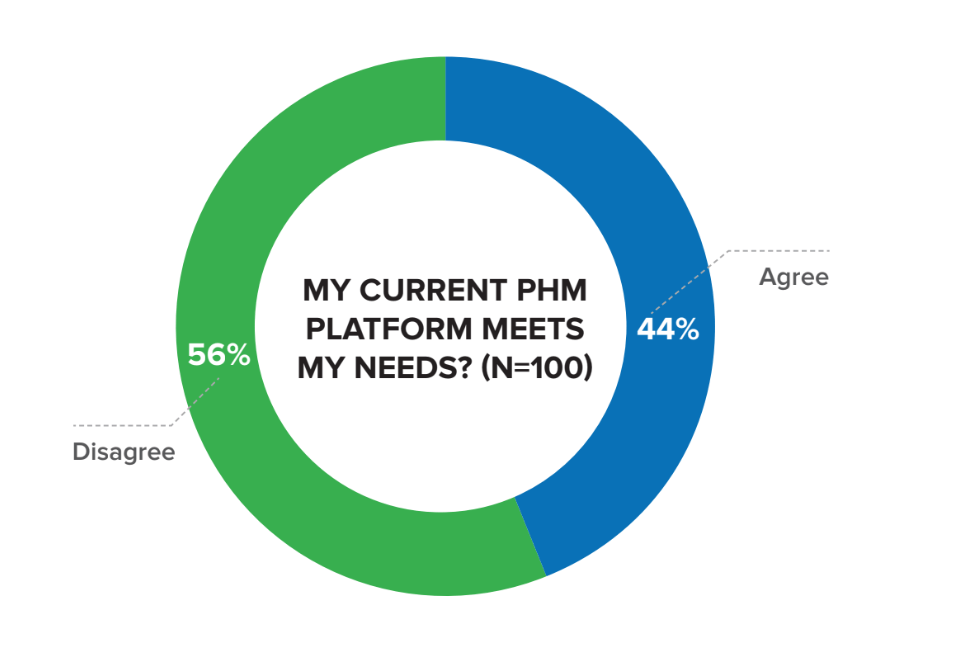
What You Should Know:
– More than half (56%) healthcare leaders say their current population health management (PHM) solution doesn’t meet their needs, according to a new survey from Persivia.
– Almost two-thirds (62%) say a lack of clinician engagement is the top reason they’re looking to replace their PHM solution. This was followed by the inability to convert data to action (48%), and inability to engage patients (43%) or perform sufficient analytics (43%) tied for third.
– The large majority (85%) say it’s very to extremely important for their PHM system to configure rules and pathways for clinical actions based on clinical needs, however, only 53% believe their PHM system can do this.
More than half of healthcare leaders say their population health management (PHM) solution doesn’t meet their needs, according to a new survey by Persivia, a provider of real-time value-based care, population health, Medicare Advantage, ACO, and quality management solutions. The survey reveals that PHM solutions are falling short, and the market has yet to produce PHM solutions that address core needs.
Survey Background
Persivia commissioned healthcare consultancy Sage Growth Partners to conduct this survey of 244 healthcare leaders in April 2020. To qualify, respondents had to participate in a value-based program and use a PHM solution. The survey found that only 41% are using a PHM solution or participating in value-based care (VBC) at all; the 59% not using PHM or participating in VBC were screened out of the remaining survey questions.
Key findings of the survey include:
Lack of clinician engagement and inability to convert data into action are top reasons to switch vendors
– More than half (56%) say their current population health management (PHM) solution doesn’t meet their needs; 44% say it does.
– Almost two-thirds (62%) say a lack of clinician engagement is the top reason they’re looking to replace their PHM solution. This was followed by the inability to convert data to action (48%), and inability to engage patients (43%) or perform sufficient analytics (43%) tied for third.
– Analytics (82%), care coordination (77%), and care management (65%) are considered the most important functions of a PHM solution. Downside risk management was the least desired function (34%), perhaps because most respondents are not participating in these types of arrangements.
While most trust their PHM data, significant issues remain
– The large majority (79%) say their care team trusts their PHM data, but fewer (65%) say their physicians trust it.
– The top reasons physicians don’t trust the data are having to leave the workflow (65%), lack of risk adjustment (61%); and data not being clean (48%), usable (43%), or accurate (39%).
– Only about half of respondents (59%) strongly or somewhat agree that their PHM solution can manage multiple VBC programs at the point of care.
Operationalizing VBC is still challenging; identifying care gaps and actionable steps to close gaps are a pain point
– While nearly all leaders (94%) expect their PHM solution to identify care gaps, only 69% say their PHM solution enables them to do so.
– Only 56% say they receive guidance on the appropriate course of action once a care gap is identified.
– The large majority (85%) say it’s very to extremely important for their PHM system to configure rules and pathways for clinical actions based on clinical needs, however, only 53% believe their PHM system can do this.
“Most respondents are relying on their EHR rather than purpose-built PHM solutions, which is a problem,” said Mansoor Khan, Persivia’s CEO. “These survey findings reveal clear failures on the part of current PHM solutions to deliver on core needs necessary for care improvement – engaging clinicians and patients, creating actionable data, and impacting care coordination and management. It’s imperative that healthcare providers get better data integration and liquidity to ensure they are truly managing the longitudinal health of their populations, something even more critical now, in a world that has been changed by COVID-19.”
The full report is available for download here.
